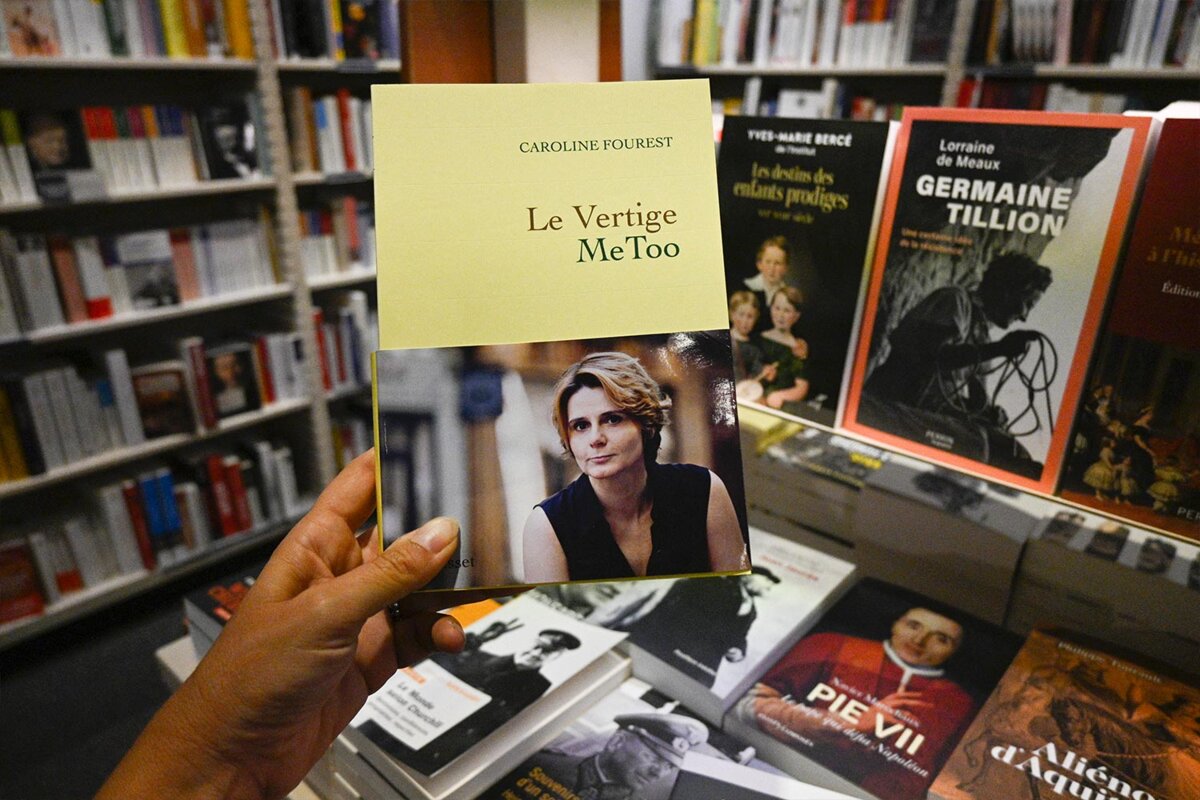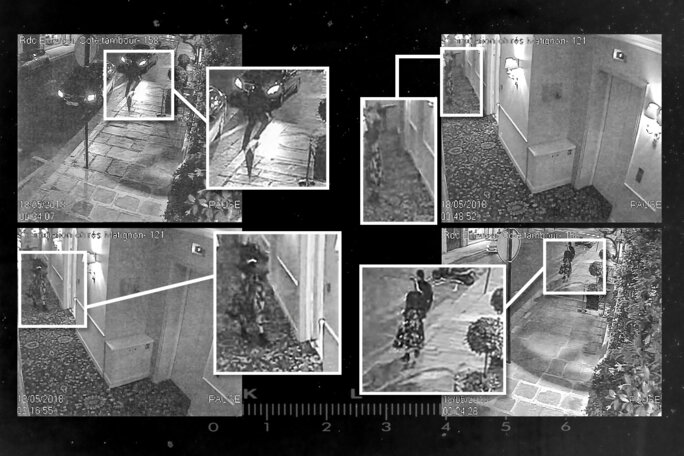The list of errors continues to grow. According to Mediapart's information, on November 4th actor Sand Van Roy, the complainant in the sexual assault case involving filmmaker Luc Besson which was later dropped, filed a defamation suit against author and broadcaster Caroline Fourest and her publisher, Olivier Nora, the chief executive officer of publishers Grasset. She accuses the writer of reporting fake news in her latest book, despite it having been repeatedly refuted - and without seeking her point of view first.
When it was released in September, 'Le Vertige MeToo' ('The MeToo Vertigo') provoked widespread reaction – not so much because of its criticisms of the #MeToo movement but because of its errors, stretching of the truth and disregard for journalistic ethics. On September 13th, in letters addressed to Caroline Fourest and her publisher, Mediapart highlighted a series of falsehoods concerning our online journal, which is mentioned 48 times in the book and severely criticised - and yet which was never approached by the writer for comment.
When questioned by BFMTV news channel about having wrongly claimed that Mediapart had “not contacted her” over an investigation we carried out into her intellectual and political journey, the journalist replied that the mistake was “no longer in the second edition [of the book], which has been reprinted”.

Enlargement : Illustration 1

When Caroline Fourest's book was shortlisted for the Femina literary prize - which was ultimately awarded last Tuesday to another author - thirteen women mentioned in it published an article in Le Nouvel Obs news magazine listing “errors” within the work and condemning what they saw as a “complete lack of knowledge of research on sexual and gender-based violence”.
The signatories to this article - including actors Judith Godrèche, Aïssa Maïga and Anouk Grinberg, Green MP Sandrine Rousseau, journalist Hélène Devynck and author Florence Porcel, plaintiffs in the case involving allegations against former news presenter Patrick Poivre d'Arvor, essayist Mona Chollet and feminist activist Caroline De Haas - argued that giving a prize to such a book would have felt like a “backwards step in the fight against sexual and gender-based violence”.
On her blog, Caroline Fourest attacked these claims as “imputations of ill will”, “fabricated lies”, and “dishonest accusations” aimed at “silencing” her. Meanwhile, having read the pages devoted to her in 'Le Vertige MeToo', Sand Van Roy has decided to take legal action. “I prefer journalists to be held accountable by the justice system, the guardian of free speech. That's what I've always done,” the actor told Mediapart, while expressing her “support for other people who have called out Caroline Fourest’s lies”.
The 37-year-old Belgian-Dutch actor accused Luc Besson of rape in 2018. Her complaint, which was leaked almost immediately to the press without her knowledge, ended with the case being dropped in France, a verdict upheld by the country's top appeal court, the Court of Cassation. She then filed a complaint for forgery of a public document against the case's investigating judge, lodged an application with the European Court of Human Rights (ECHR) and, in 2022, filed a new rape complaint against the film director in Belgium.
In a chapter of her book entitled 'The Frenzy', Caroline Fourest discusses this case over three pages, criticising Mediapart's handling of the story and taking aim at a “series of articles that dealt a real blow to the director-producer’s reputation, to the success of his films in France, on top of the furore and exposure his family had to endure”.
The essayist gives the filmmaker his say, describing how, during their conversation, he was “still unsettled by this complaint after a relationship he believed was sincere”. However, she does not quote Sand Van Roy, who told Mediapart that she was “never” approached for her view, either directly or through her lawyers.
'Fake news' that was debunked as early as 2018
Recounting the events, Caroline Fourest refers to a “two-year romantic relationship” between the director and Sand Van Roy, who “accuses him of having drugged and mistreated her during painful anal relations in a suite at the Bristol Hotel [editor's note, in Paris], where they had arranged to meet”. According to the actor's complaint, seen by Mediapart, this summary lacks “any degree of context”, and sticks solely to Luc Besson’s version of events.
The actor reiterates in her complaint that she has “always denied having had a romantic relationship” with the filmmaker, consistently maintaining that the late-night meeting was “professional” and “at the request” of the man who at the time was “her mentor, her employer” and who used the Bristol as the “main venue for his professional as well as personal meetings”. This is what she stated the day after the incident when she made an emergency call to the police, a transcript of which is in the case file, in which she asserted that the director had “put pressure on her” to come and work late because he was leaving the next day.
More crucially, Sand Van Roy says in her complaint that by discussing a claim that the actor had been drugged, Caroline Fourest is perpetuating a “lie” that has been “corrected multiple times”. In that call to the police and in her rape complaint, the actor never referred to the use of drugs. She told police officers she had shared “a tea” with Luc Besson in his suite, felt unwell twice during and after the alleged rape, and lost consciousness. Toxicology tests carried out by investigators came back negative.
But at the time, several media outlets reported that the complainant had indeed claimed she had been drugged, something which undermined her credibility. As early as 2018, Mediapart debunked this fake news, which arose from a misinterpretation of a report by Europe 1 radio (quickly amended after publication) and the response of the filmmaker’s lawyer, who stated that it was “absurd to imagine” that his client “could have drugged a woman to rape her”.
The actor and her lawyers at the time responded swiftly: through press releases, numerous rights of reply and denials. Some media outlets corrected their articles. Sued by Sand Van Roy, the British tabloid the Daily Mail apologised on its website and at the High Court in London, acknowledging it had spread “false information” and that “Ms Van Roy never accused Mr Besson of having drugged her”, according to the 2021 ruling, seen by Mediapart.
As far as the actor and her lawyer are concerned, Caroline Fourest could not have been “unaware” of these numerous corrections. “A simple Google search would have sufficed to discover that Ms Van Roy never accused Luc Besson of having drugged her,” the complaint asserts, demonstrating that the keywords “Sand Van Roy drugged” immediately lead to several denials, including the Daily Mail apology and the Mediapart article recounting the history of the false claim.
The “regurgitation in the media” of this fake news by Caroline Fourest, six years later, “wrongly portrays Ms Van Roy as a liar”, Sand Van Roy’s complaint argues. It goes on to note that by mentioning that “toxicology tests did not reveal the presence of [editor's note, the drug] GHB (only chamomile), Ms Fourest falsely suggests that Ms Van Roy lied, deceiving the reader and the public as to her character and personality”.
'Surveillance footage contradicting the book'
In her complaint, the actor challenges another section of the book: this is where Caroline Fourest refers to “footage from the hotel corridor showing her arrival at the room and their departure (embracing)” on the night of the incident, at the Bristol hotel. Yet, states Sand Van Roy, in her complaint “nothing of the sort appears in the surveillance footage”.

Enlargement : Illustration 2

In that footage, which was submitted to the judicial process in 2018 and also reviewed by Mediapart, the actress “leaves the lift alone on the third floor” of the Bristol at 12.48am to go to Luc Besson’s suite, as noted by police in their report; then, at 2.16 am, she “leaves the room alone”, heading “towards the lift with her mobile phone in her hand”. Luc Besson himself had entered his room earlier, at 11.55pm, and did not leave until the following noon.
The defamation claim made by Sand Van Roy also targets Caroline Fourest’s reference to these two elements of the investigation - the toxicological analysis and the surveillance footage – as being among the “pieces of evidence that quickly weaken the accuser’s account” following an “uncompromising investigation”.
[Caroline Fourest] subjugates the facts and their protagonists to a false framing, a spurious discourse of moderation, to her own falsehood.
Sand Van Roy's lawyer, Antoine Gitton, says that by asserting this and only giving “Luc Besson’s side of the story”, while discussing the issue in a chapter about “hysteria”, the journalist is “equating the case-dismissed verdict with the truth of the facts”. He told Mediapart: “She must be aware that a case not being pursued does not imply that the complaint is baseless. It means there was not enough evidence to bring the person before a trial court.”
The lawyer attacks what he calls “hypocrisy” and believes that Caroline Fourest “subjugates the facts and their protagonists to a false framing, a spurious discourse of moderation, to her own falsehood”. Antoine Gitton continued: “She's not investigating. She's only serving herself, damaging public discourse and undermining the truth - an essential condition for equality and, of course, for the cause of women.”
In the actor's complaint, the lawyer emphasises the “harm” suffered by his client, who has been “discredited and thrown to the wolves”, and who had already been suffering from severe “mental anguish” since 2018. This is corroborated by statements from several doctors and official organisations, which said her mental state had affected her ability to work.
Contacted by Mediapart, Caroline Fourest did not comment on the factual errors highlighted in Sand Van Roy’s complaint, nor on the fact that she had not sought the actor's input for the book. “I based this paragraph on the case file from the investigation compared to your version (Mediapart's),” she simply stated, going against the content of the statements in the judicial file. She again referred to elements from the “investigation [which] quickly demonstrated the extreme fragility of this [editor's note, rape] complaint”, such as a “toxicology examination linked to the complainant's initial statements” and the “images from the surveillance cameras”.
As she does in her book, she criticised Mediapart’s handling of the Besson case and the author of this article, taking the view that it amounted to a “series of articles which, despite a few precautions taken to cover yourselves, cast a lingering shadow of suspicion over Besson’s guilt”(read her full response in the black box below).
When contacted for comment, her publisher, Olivier Nora, stated that “as of today” he was “unaware” of any such complaint, noting that the matter was in any case covered by the “confidentiality of the investigation” process, adding that “if there is indeed a complaint, I'll reserve my responses for the judicial proceedings”.
-----------------------------------------------------------------------------
- The original French version of this article can be found here.
English version by Michael Streeter


